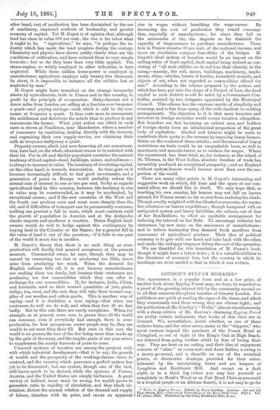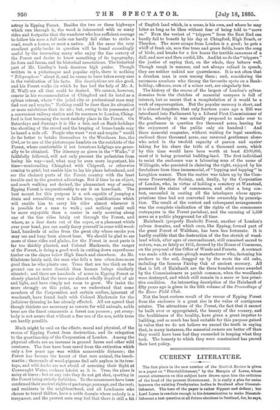LONDON'S SYLVAN DOMAINS.* THE appearance, in a popular form and
at a low price, of another book about Epping Forest may, we hope, be regarded as a proof of the growing interest felt by the community around us in all that concerns the sylvan beauties of Greater London. For publishers are quick at reading the signs of the times, and albeit they occasionally read them wrong, they are oftener right ; and the publication of Mr. Lindley's " Walks " almost simultaneously with a cheap edition of Mr. Buxton's charming Epping Forest are pretty certain indications that books of this class are in demand. We, nevertheless, doubt whether, as one of these authors hints, and the other avers, many of the "trippers," who never venture beyond the precincts of the Forest Hotel at Chingford, or out of sight of the King's Oak at High Beach, are deterred from going further afield by fear of losing their way. They are bent on an outing, and their idea of enjoyment consists of " shies " at cocoa-nuts and Aunt Sallies, a swing in a merry-go-round, and a shamble on one of the wretched ponies, or diminutive donkeys, provided for their enter- tainment by the enterprising horse and ass keepers of Loughton and Buckhurst Hill. And except on a dark night, or in a thick fog (when you may lose yourself as completely in Monk's Wood or on Fair Mead Plain as you could in a tropical jangle or an African desert), it is not easy to go far
* Walks in Epping Forest. Edited by Percy Lindley. London : 123 and 125 Fleet Street. E.C.—Journal of Proceedings of the Eases; Field Club. Part I. Vol. IV. (June, 1885). Published by the Club, Buekhurst Hill, Essex.
astray in Epping Forest. Besides the two or three highways which run through it, the wood is intersected with so many rides and footpaths that the wanderer who has sufficient courage to follow his nose a full mile can hardly fail either to strike a road, reach a house, or meet a native. All the same the very excellent guide.books in question will be found exceedingly useful by the increasing many who enjoy the fine scenery of the Forest and desire to know something of its topography, its flora and fauna, and its historical associations. The historical part of Mr. Lindley's book deserves high praise. Though written in a picturesque and popular style, there is nothing " Telegraphese" about it, and he seems to have taken every care in the verification of his facts. His descriptions are also good, and his Forest walks (in which he has had the help of Mr. A. H. Wall) are all that could be desired. We cannot, however, concur in his recommendation of Chingford and its hotel as a sylvan retreat, where "the jaded city or professional man may find rest and respite." Nothing could be finer than its situation or more salubrious than its air ; but, owing to its possession of a convenient railway station and its nearness to London, Ching- ford is fast becoming the most rackety place in the Forest. On Saturdays and Sundays it is like a fair, and on Bank-holidays the shouting of the crowd and the braying of brass-bands may be heard a mile off. People who want "rest and respite" would do far better to betake themselves to the Woodman Inn, the Owl, or to one of the picturesque hamlets on the outskirts of the Forest, where comfortable if not luxurious lodgings are gener- ally to be obtained. The itinerary as given in the "Walks," if faithfully followed, will not only prevent the pedestrian from losing his way—and, what may be even more important, his time—confounding Chingford with Chigwell, or otherwise coming to grief, but enable him to lay his plans beforehand, and see the choicest parts of the Forest country with the least trouble and to the greatest advantage. But if time be an object, and much walking not desired, the pleasantest way of seeing Epping Forest is unquestionably to see it on horseback. The best mount for this purpose is a cob capable of jumping a drain and scrambling over a fallen tree, qualifications which will enable him to carry his rider almost wherever it is possible for a man to walk ; and nothing could well be more enjoyable than a canter in early morning along one of the fine rides lately cut through the Forest, and where, as a deer darts out of the copse, or a pheasant whirls over your head, you can easily fancy yourself in some wild wood- land, hundreds of miles from the great city whose smoke you may see and busy hum almost hear. We should be glad to see more of these rides and glades, for the Forest in most parts is far too thickly planted, and Colonel Mackenzie, the ranger of the Forest, is doing a good work in cutting down superfluous timber on the slopes below High Beach and elsewhere. As Mr. Gladstone lately said, the man who fells a tree often does more good than he who plants one. Trees that are too thick on the ground can no more flourish than human beings similarly situated ; and there are hundreds of acres in Epping Forest so closely planted that the trees are almost wholly deprived of air and light, and have simply not room to grow. We insist the more strongly on this point, as we understand that some members of the Corporation and certain scribes, ignorant of woodcraft, have found fault with Colonel Mackenzie for the judicious thinning he has already effected. All are agreed that though thickets are necessary as coverts for wild animals, noble trees are the finest ornaments a forest can possess ; yet every- body is not aware that without a free use of the axe, noble trees are hardly possible.
Much might be said on the effects, moral and physical, of the rescue of Epping Forest from destruction, and its relegation to the guardianship of the Corporation of London. Among the physical effects are an increase in ground fauna and other wild creatures. The deer have been saved from the extinction which only a few years ago was within measurable distance; the Forest has become the haunt of that rare animal, the beech- martin ; thousands of wood-pigeons find safe asylum in its tree- tops, and wild-ducks are not afraid of arresting their flight at Connaught Water, cockney lakelet as it is. True, the place is noisy at times ; but at any rate they do not get shot, sporting in the Forest being strictly forbidden. To the commoners have been confirmed their ancient rights of pasturage, pannage, and the rest; and residents in the neighbourhood, and all Londoners who choose to travel thither, have a noble domain where nobody is a trespasser, and the poorest man may feel that there is still a bit of English land which, in a sense, is his own, and where he may loiter as long as he likes without fear of being told to "move on." Even the veriest of " trippers " from the East End can hardly fail to benefit by his day at Chingford, High Beach, or Theydon. The mere escape from London is a good ; he gets a whiff of fresh air, sees fine trees and green fields, hears the song of birds, and breaks for a few hours the terrible sameness of a dull, and now and then sordid, life. And let us do the" trippers" the justice of saying that, on the whole, they behave well. Though rough in manner, and not always refined in speech, they are neither unkind nor quarrelsome. It is not often that a drunken man is seen among them ; and, considering the enormous numbers who throng the favourite spots on a Bank- holiday, offences, even of a minor sort, are singularly few.
The history of the rescue of the largest of London's sylvan domains from the clutches of manorial usurpers is full of interest, but so recent that a recapitulation of it would be a work of supererogation. But the popular memory is short, and it is almost forgotten that only fourteen years ago a Bill was introduced into Parliament by a Liberal First Commissioner of Works, whereby it was actually proposed to make over to the gentlemen in question five thousand acres, leaving for the enjoyment of the public only six hundred ! And these manorial magnates, without waiting for legal sanction, enclosed three thousand acres, one reverend gentleman alone, Who acted in the twofold capacity of parson and squire, taking for his share the trifle of a thousand acres, which by this time would have been worth at least 2100,000, most of it being potential building-land. The first individual to resist the enclosure was a labouring man of the name of Willingale, who persisted in claiming the right, enjoyed by his forefathers from time immemorial, of "lopping and topping" in Loughton manor. Then the matter was taken up by the Corn. mons Preservation Society, and, finally, by the Corporation of London, who, in virtue of holding a cemetery at Wanstead, possessed the status of commoners, and after a long con- test, succeeded in ousting all the interlopers whose appro- priations time had not converted into ownership by prescrip- tion. The result of the contest and subsequent arrangements was the complete vindication of the rights of the commoners (ratepayers in the Forest parishes), and the securing of 5,500 acres as a public playground for all time.
Hainhault (properly Henholt) Forest, another of London's sylvan domains, and which once, like Epping, formed part of the great Forest of Waltham, has been less fortunate. It is hardly credible that the destruction of the fine stretch of wood- land which, after ages of encroachment, still remained sacred to nature, was, so lately as 1851, decreed by the House of Commons, on the proposal of the Office of Woods and Forests. A contract was made with a steam-plough manufacturer who, fastening his anchors to the soil, dragged up by the roots the old oaks, including the famous Fairlop Oak of ancient memory. All that is left of Hainhault are the three hundred acres awarded by the Commissioners as parish common, when the woodlands were destroyed, and which still remain in a more or less primi- tive condition. An interesting description of the Hainhault of fifty years ago is given in the fifth volume of the Proceedings of the Essex Field Club.
Not the least curious result of the rescue of Epping Forest from the enclosers is a great rise in the value of contiguous estates. The attractions of the Forest, the fact that it cannot be built over or appropriated, the beauty of the scenery, and the healthiness of the locality, have given a great impetus to building, and so much has land suitable for this purpose gained in value that we do not believe we exceed the truth in saying that, in many instances, the manorial owners are better off than they would have been had they succeeded in keeping what they took. The honesty to which they were constrained has proved their best policy.



































 Previous page
Previous page